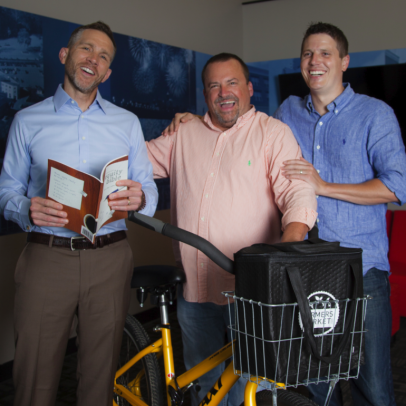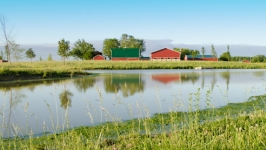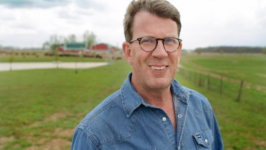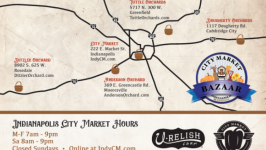The Past, Present and Future of Indiana Food, Technology and Start-ups
Edible Indy invited John Wechsler of Launch Fishers; Nick Carter of FarmersMarket.com and formerly Husk; and Gerry Hays of Slane Capital to sit down with contributor Meredith Lee and discuss local food start-ups, technology and the future of food. Here’s how the conversation went.
Meredith: In my neighborhood, I see an influx of local food in groceries and restaurants. My neighborhood farmers’ market is growing. When I visit social media, my friends are thoroughly excited about their food. It wasn’t like this when I was growing up. How did we get here?
Gerry: We aren’t inventing anything new. Food in America changed during World War I and World War II. A number of food innovations came out of World War II when we needed to feed troops stationed overseas. That movement continued into the ’50s and ’60s, with concepts like the frozen dinner. Now, food is stored, mass-produced and canned and there’s an effort to extend shelf life. Food became all about convenience.
Nick: Also because of the World Wars, women went into the workforce and they remained there. Before, a wife might start making dinner early in the afternoon so that it would be ready when her husband got home. Most families today don’t have a four-hour meal prepared by a stay-at-home mom.
Gerry: Then, there’s fast food: $100 billion a year is spent on fast food. Over the last generations, we forgot what food means. Now, we’re starting to experience our food, taste our food and learn about our food. While everyone thinks this is cool and new, our great-great-grandparents lived the lifestyle that we’re aspiring to lead.
Nick: In some communities, that old style was preserved from pre-war to today. Ethnic communities—like the Italians and Greeks, for example—did not forget how to prepare meals or enjoy food. Indiana doesn’t have much of a deep cultural background, so we were prime ground for becoming addicted to cultureless, postwar convenience food.
Gerry: Everything is on the table for exploration in Indiana because we don’t have legacy or diversity in food. Right now, Hoosiers are open to trying different foods, ways to prepare food and ways to enjoy food. Food start-ups are working to build an ecosystem around a better food offering.
Meredith: How is technology helping food start-ups to facilitate the shift?
Nick: Technology is an equalizer. Small start-ups could not break into the grocery industry without technology. Technology makes it possible for a start-up like DinnerCall to forgo the gatekeepers and get in touch with consumers directly.
Gerry: Technology also allows start-ups to focus on sales and marketing. This allows them to build business in a cost-effective way. Even just 50 years ago, it was too expensive to build a customer base through traditional media or grocery stores.
Nick: With FarmersMarket.com, I couldn’t afford billboards, radio or television advertising, so there was a barrier to entry. But with Facebook, I could figure out my target buyer and put my ad in front of them specifically.
Meredith: How is our Indiana location beneficial to food start-ups?
John: Because of our agricultural heritage and history as a major supplier of America’s food, we’re naturally positioned to innovate. There’s a lot of history and experience built up in Indiana.
Nick: Short of lemons and bananas, anything can be grown here. Husk is a true food start-up with a tangible food product. Our access to logistics here is important. We’re in the crossroads of America. We have so much warehousing around here and it is easy to move food around. There are not a lot of places with the same access as we have here.
Gerry: We built Kingmaker Foods from the ground up. We’ve had access to real estate as we’ve grown and we can get a truckload of product to two-thirds of the population in one day.
Meredith: What are common obstacles to growth in Indiana’s food start-up sector?
John: It’s hard to get people to deviate from their traditional paths and adopt a new way of thinking. Acceptance is the biggest obstacle.
Nick: I came from technology start-ups and moved into grocery start-ups. The start-up community in Indiana is strong in technology, but not in grocery. In grocery, people are not as friendly and not many people are trying to innovate. Innovating in food involves tearing down an old paradigm whereas an industry like technology is innovative by nature.
Gerry: In technology, they cover a new territory with a new idea. In food, we’re covering old territory with a new idea. It scares people. I’ve been in food since 2004 and I’ve found it to be one of the most paranoid industries out there.
Meredith: What resources would you recommend to a Hoosier food start-up in its infancy?
Gerry: Don’t go looking for money first. Find someone who knows the tracks and use them as a mentor. Get in front of someone like Nick or me. It’s not a huge community, but everyone connected to it is willing to advise and give a few hours of their time.
John: Launch Fishers and Launch Indiana are resources for start-ups. At Launch, we look for innovation-driven enterprises. It doesn’t have to be innovative in software or technology. It could be kettle chips. We want to help innovators get their businesses up and running. People can also tap into crowdsourcing through platforms like Kickstarter and Indiegogo. These platforms allow start-ups to sell to consumers directly. Crowdfunding can also help
food entrepreneurs to raise money to start a project. We’re one of the first states to innovate in crowdfunding.
Meredith: What’s next for food innovations in Indiana?
Gerry: The fast-food story has had its heyday and it’s on the way out like Betamax and VHS. People just don’t want their food wrapped in a bag and handed to them in the back seat of a car anymore. People are tired of it. And all of the pressure on reducing sugar and soft drinks and the push for health and wellness is too much for fast food to overcome. People will look to slow down in a fast-paced life. That’s going to hurt fast food and create opportunities for new food start-ups.
Nick: I expect that in the future people will buy their groceries from multiple places. They will enjoy the process of finding what they want from specialty stores rather than shopping for everything from oatmeal to ammunition at Walmart and leaving with one cart. At FarmersMarket.com, we find that a lot of consumers are already interested in decentralizing their food shopping. They want to buy products that they cannot find in grocery and we’re offering it at FarmersMarket.com. We’re getting good receptivity.
Gerry: We lost several local food manufacturers in Indianapolis, and that left a void for smaller co-packing manufacturing. At Kingmaker Foods, we’re filling that niche. We help smaller food start-ups get to market by manufacturing their product. That way, they can focus on sales and marketing.








